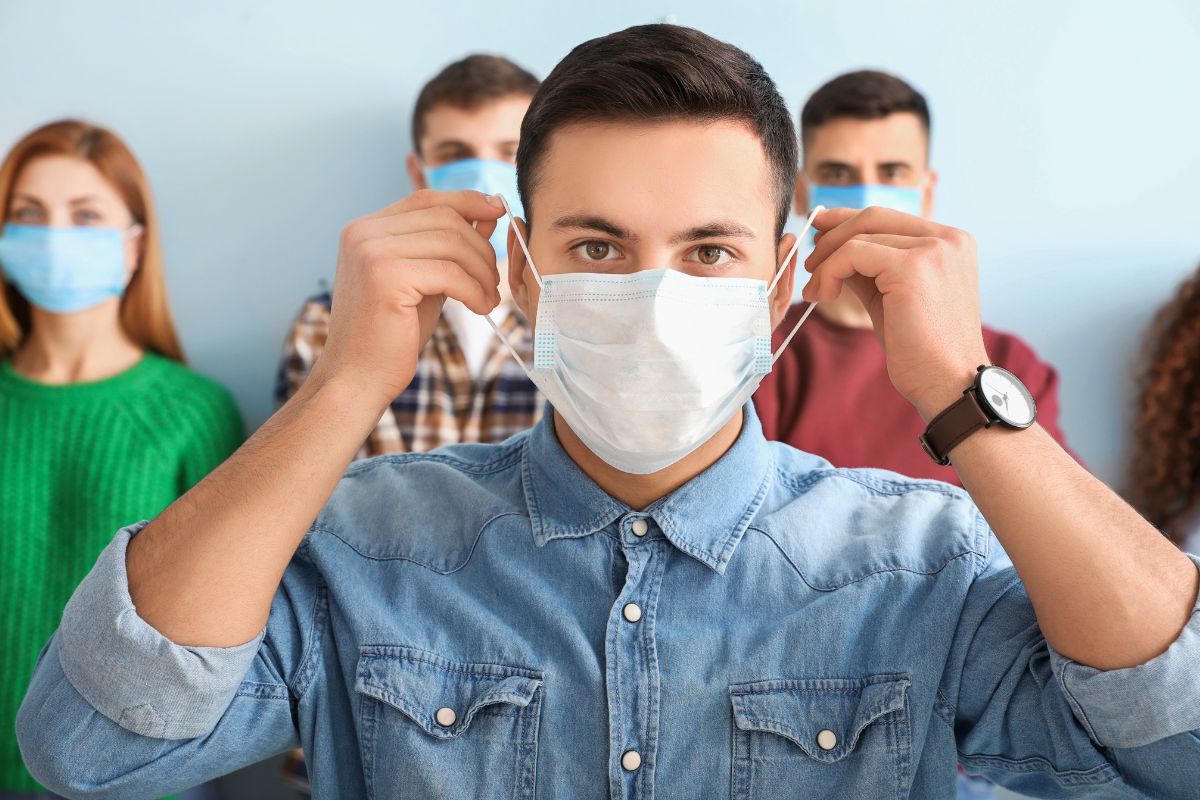The term “mask” has gained prominence over the last few years. Prior to the COVID-19 pandemic, most individuals only donned masks within hospitals or during peak pollution periods. However, when the virus began to spread across the globe, masks became an essential protective tool. Even today, many people continue to wear masks on a daily basis in India and all over the world.
The present article sheds light on the importance of masks and how beneficial they are, especially now that the COVID cases are rising again.
Why Were Masks Needed During COVID-19?
The primary reason why COVID-19 increased so abruptly is due to its primarily airborne transmission. Whenever an infected individual coughs, sneezes, or even engages in a basic conversation, small liquid droplets are emitted. If an uninfected person inhales any of those droplets, it is likely they will catch the disease.
The primary function of masks is to stop the release of those droplets. When you are using a mask, you safeguard your mouth and nose from germs. If each and every citizen is masked up, the chances of spread would dramatically reduce.
With the arrival of the pandemic, masks became a necessity not only in cities but also in small towns and villages in India. They became a common sight in buses, trains, shops, schools, and even temples.
Top Benefits of Wearing a Mask
Protects from Viruses
The main job of a mask is to protect from viruses like COVID-19. Masks reduce the chances of the virus getting into your body. Even if someone close to you is sick, your mask acts like a shield.
This is very important in crowded places like markets, weddings, or public transport in Indian cities like Delhi, Mumbai, or Kolkata.
Stops You from Spreading Germs
If you are sick and don’t know it yet, your mask can stop your germs from spreading to others. Many people with COVID-19 had no signs but could still pass the virus to others.
Wearing a mask daily helps keep your family, co-workers, and strangers safe.
Useful for People with Weak Health
People who have diabetes, asthma, or heart problems are at a higher risk from viruses. For them, wearing a mask is not just good — it is needed.
In India, where many people suffer from these health problems, wearing a mask can be a simple way to stay safe.
Blocks Dust and Pollution
India has many cities with high air pollution levels. Wearing a mask helps filter out dust, smoke, and harmful gases. This is helpful not only during a pandemic but also in everyday life.
Auto drivers, traffic police, and delivery boys often wear masks now because it helps them breathe cleaner air.
Keeps You Away from Common Illnesses
Masks can also stop other germs like cold and flu viruses. If fewer people get sick, hospitals and doctors won’t be under too much pressure. This is good for our health system.
In cities like Bangalore or Pune, offices and schools saw fewer cases of common flu because of regular mask use.
Gives a Sense of Safety
For many people, especially older ones, masks make them feel safe when they go out. Even if the risk is low, it brings peace of mind.
A simple mask can make you feel ready to face the world.
Is It Good to Use a Mask Every Day?
The answer is – yes, in many cases. But it also depends on your surroundings.
When Is It a Good Idea to Wear a Mask Daily
- In crowded areas: Buses, trains, offices, markets, malls.
- If you are feeling sick: Even a simple cold can spread to others.
- If someone around you is coughing or sneezing.
- If you have health problems, it adds an extra layer of safety.
- During flu season: Usually around winter months.
When You May Not Need It
- When you are at home and no one is sick.
- While walking alone outdoors in fresh air.
- When you are doing heavy physical work like farming or running, unless the air is polluted.
So, wearing a mask every day is not bad. In fact, in many Indian households, people now keep masks with their keys and wallets, ready to wear when needed.
Types of Masks People Can Use
There are many types of masks. Some are better than others.
1. Cloth Masks
- Made of cotton or soft material.
- Washable and reusable.
- Good for everyday use, especially in low-risk areas.
2. Surgical Masks
- Light blue or white masks.
- Used in hospitals.
- Blocks droplets well.
- Meant for one-time use.
3. N95 Masks
- Gives higher protection.
- Filters very small particles.
- Best for crowded or high-risk places.
4. Homemade Masks
- Many people in India make masks at home.
- Use thick cotton with three layers.
- These are cost-friendly and work well if worn correctly.
Tips for Wearing a Mask Correctly
- Cover your nose and mouth fully.
- Wash your hands before touching the mask.
- Do not touch the front side of the mask.
- If it’s a disposable mask, throw it away after use.
- Wash cloth masks after every use.
Wearing a mask incorrectly is like wearing no mask at all.
Is There Any Harm in Wearing a Mask Daily?
Most people can wear a mask without problems. But here are a few things to keep in mind:
- Don’t wear it too tight – it should be comfortable.
- Take short breaks if you are wearing it for long hours.
- Children under two should not wear masks.
- If you have breathing problems, check with your doctor first.
For others, wearing a mask daily is not harmful. In fact, many doctors, nurses, and workers wear them for hours every day.
Final Thoughts
Mask-wearing not only prevents the spread of viruses but also shields one from air pollution and dust particles in the environment, whilst having little monetary impact. This makes it incredibly useful and beneficial.
Thus, it is correct to say that wearing a mask on a daily basis in crowded public places and in heavy traffic regions is justified. It is a dutiful practice not just during times of medical emergency but throughout one’s daily routine.
Honing this practice is particularly beneficial in keeping the lungs healthy. Hence, the next time you step outside of the house, be sure it’s the mask you grab. Doing so will make those around you feel safer.












